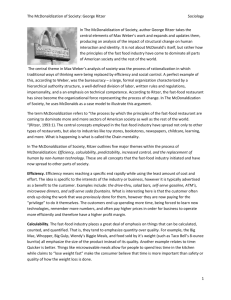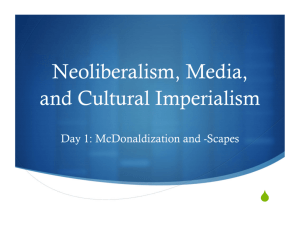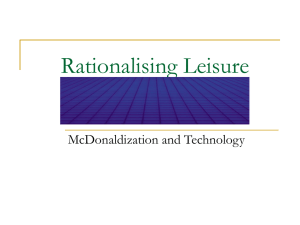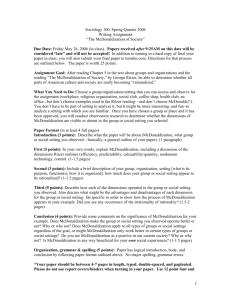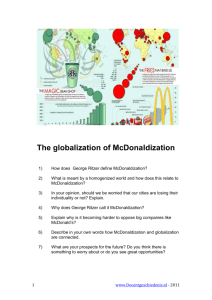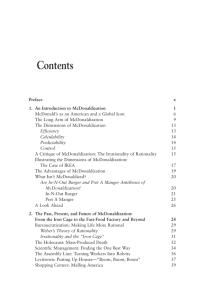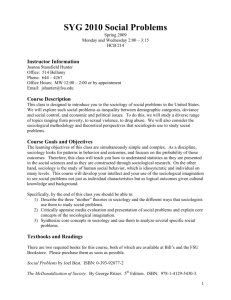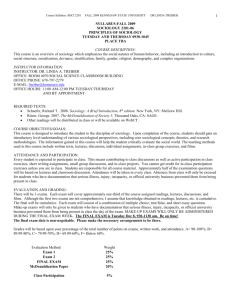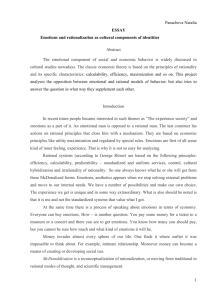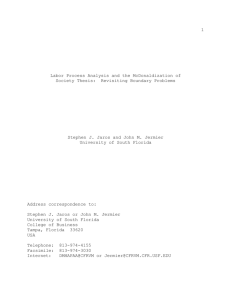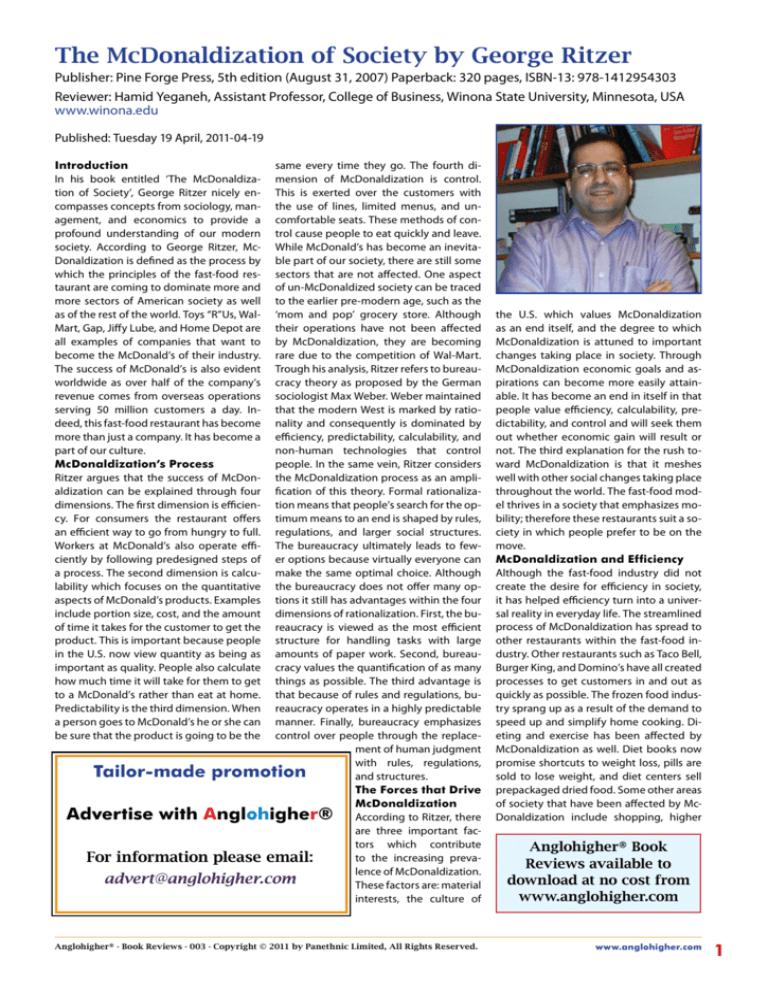
The McDonaldization of Society by George Ritzer
Publisher: Pine Forge Press, 5th edition (August 31, 2007) Paperback: 320 pages, ISBN-13: 978-1412954303
Reviewer: Hamid Yeganeh, Assistant Professor, College of Business, Winona State University, Minnesota, USA
www.winona.edu
Published: Tuesday 19 April, 2011-04-19
Introduction
In his book entitled ‘The McDonaldization of Society’, George Ritzer nicely encompasses concepts from sociology, management, and economics to provide a
profound understanding of our modern
society. According to George Ritzer, McDonaldization is defined as the process by
which the principles of the fast-food restaurant are coming to dominate more and
more sectors of American society as well
as of the rest of the world. Toys “R”Us, WalMart, Gap, Jiffy Lube, and Home Depot are
all examples of companies that want to
become the McDonald’s of their industry.
The success of McDonald’s is also evident
worldwide as over half of the company’s
revenue comes from overseas operations
serving 50 million customers a day. Indeed, this fast-food restaurant has become
more than just a company. It has become a
part of our culture.
McDonaldization’s Process
Ritzer argues that the success of McDonaldization can be explained through four
dimensions. The first dimension is efficiency. For consumers the restaurant offers
an efficient way to go from hungry to full.
Workers at McDonald’s also operate efficiently by following predesigned steps of
a process. The second dimension is calculability which focuses on the quantitative
aspects of McDonald’s products. Examples
include portion size, cost, and the amount
of time it takes for the customer to get the
product. This is important because people
in the U.S. now view quantity as being as
important as quality. People also calculate
how much time it will take for them to get
to a McDonald’s rather than eat at home.
Predictability is the third dimension. When
a person goes to McDonald’s he or she can
be sure that the product is going to be the
same every time they go. The fourth dimension of McDonaldization is control.
This is exerted over the customers with
the use of lines, limited menus, and uncomfortable seats. These methods of control cause people to eat quickly and leave.
While McDonald’s has become an inevitable part of our society, there are still some
sectors that are not affected. One aspect
of un-McDonaldized society can be traced
to the earlier pre-modern age, such as the
‘mom and pop’ grocery store. Although
their operations have not been affected
by McDonaldization, they are becoming
rare due to the competition of Wal-Mart.
Trough his analysis, Ritzer refers to bureaucracy theory as proposed by the German
sociologist Max Weber. Weber maintained
that the modern West is marked by rationality and consequently is dominated by
efficiency, predictability, calculability, and
non-human technologies that control
people. In the same vein, Ritzer considers
the McDonaldization process as an amplification of this theory. Formal rationalization means that people’s search for the optimum means to an end is shaped by rules,
regulations, and larger social structures.
The bureaucracy ultimately leads to fewer options because virtually everyone can
make the same optimal choice. Although
the bureaucracy does not offer many options it still has advantages within the four
dimensions of rationalization. First, the bureaucracy is viewed as the most efficient
structure for handling tasks with large
amounts of paper work. Second, bureaucracy values the quantification of as many
things as possible. The third advantage is
that because of rules and regulations, bureaucracy operates in a highly predictable
manner. Finally, bureaucracy emphasizes
control over people through the replacement of human judgment
with rules, regulations,
Tailor-made promotion
and structures.
The Forces that Drive
McDonaldization
Advertise with Anglohigher® According to Ritzer, there
are three important factors which contribute
to the increasing prevaFor information please email:
lence of McDonaldization.
advert@anglohigher.com
These factors are: material
interests, the culture of
Anglohigher® - Book Reviews - 003 - Copyright © 2011 by Panethnic Limited, All Rights Reserved.
the U.S. which values McDonaldization
as an end itself, and the degree to which
McDonaldization is attuned to important
changes taking place in society. Through
McDonaldization economic goals and aspirations can become more easily attainable. It has become an end in itself in that
people value efficiency, calculability, predictability, and control and will seek them
out whether economic gain will result or
not. The third explanation for the rush toward McDonaldization is that it meshes
well with other social changes taking place
throughout the world. The fast-food model thrives in a society that emphasizes mobility; therefore these restaurants suit a society in which people prefer to be on the
move.
McDonaldization and Efficiency
Although the fast-food industry did not
create the desire for efficiency in society,
it has helped efficiency turn into a universal reality in everyday life. The streamlined
process of McDonaldization has spread to
other restaurants within the fast-food industry. Other restaurants such as Taco Bell,
Burger King, and Domino’s have all created
processes to get customers in and out as
quickly as possible. The frozen food industry sprang up as a result of the demand to
speed up and simplify home cooking. Dieting and exercise has been affected by
McDonaldization as well. Diet books now
promise shortcuts to weight loss, pills are
sold to lose weight, and diet centers sell
prepackaged dried food. Some other areas
of society that have been affected by McDonaldization include shopping, higher
Anglohigher® Book
Reviews available to
download at no cost from
www.anglohigher.com
www.anglohigher.com
1
education, healthcare, and entertainment.
The department stores, shopping malls,
and even gas stations have all become
streamlined stores which allow consumers to buy products quickly and efficiently.
Universities now provide assessments that
can be graded by a machine, leaving academics more time for research and publication. Likewise, because of DVDs people
no longer see it as efficient to go to the
movie theater. Now more efficient modes
of entertainment are available such as
Netflix, which allows consumers to have
movies delivered directly to their homes.
People can also now listen to audio books
instead of reading them.
McDonaldization and Calculability
Ritzer uses the term calculability to describe how a McDonaldized society like
the United States of America emphasizes
quantity over quality. The emphasis on
quantity in fast food restaurants leads to
decreased quality for the customers, but
customers are not the only people that
suffer from the restaurants striving for
quantity instead of quality. The most efficient way to produce mass quantities of
food is to have the food preparation process broken down into several individual parts. Like Henry Ford’s assembly line,
each worker is conducting one small task
repetitively which leads to employees feeling no sense of personal meaning or pride
in their work. Thus, both the employees
work experience and the services provided by the employees suffer a decrease in
quality. Ritzer argues that everything in a
McDonaldized society must be quantifiable. For example, in the current day educational system in the United States “the
focus seems to be on how many students
(‘products’) can be herded through the
system and what grades they earn rather
than the quality of what they have learned
and of the educational experience” (Ritzer,
page 84). Ritzer points out that the entire
educational system has become quantified in the sense that the students are now
evaluated by their Grade Point Average
(GPA) and how their GPA ranks against that
of their fellow classmates. Also, colleges
have become quantified by how they rank
against other colleges in any particular
area. Similarly, television shows are quantified because stations use a ratings system
to determine which shows stay on the air
and which shows will be cancelled.
McDonaldization and Predictability
When customers walk into a McDonalds
anywhere in the world they will get the
same experience regardless of location.
The employees will be wearing the same
2
uniforms and addressing the customer
with the same basic responses. The same
repetitive tasks not only increase efficiency, but also enable companies to consistently produce the same products each
time, thus making the employees duties
predictable. Predictability and McDonaldization have hugely affected the movie
industry in the United States. The customers need for predictability in a McDonaldized society has lead to a significant
increase in movies with unoriginal plots
and movies with multiple sequels. Ritzer
uses movies such as: The Ring, Spiderman,
Saw, The Matrix, Shrek, and Mission Impossible, to exemplify modern movies that
have spawned multiple sequels. It seems
that the customers feel more comfortable
with movies that are not completely original. According to Ritzer, sequels and movies with unoriginal plots are more likely to
succeed at the box office than movies that
are completely original, and therefore the
profits are more predictable. Another way
that the movie industry has succumbed
to predictability is the rating system that
is applied to all movies. Predictability has
also affected how people living in a McDonaldized society go about their shopping. Most people now do their shopping
in malls, which are filled with McDonaldized shops that sell the same predictable products in all of their stores throughout the world.
McDonaldization and Control
According to Ritzer, the non-human technology is controlling not only workers, but
also consumers as well. For instance, at
McDonald’s the non-human technology
increases the control over the employees
making sure that customers are getting
exactly what they wanted every time they
place an order. The same can be said for
doctors and how they treat their patients.
The main doctor is now just the start of the
process of diagnosing what a patient may
have. The doctor will send the patient elsewhere after examining the patient, perhaps to a specialist or to other experts. In
essence, the general practitioner or family doctor isn’t the solution anymore like
it used to be. A person’s doctor is just the
start of a long pathway for some patients
who are trying to figure out what is wrong.
People with creative ways of doing work
aren’t always the ones coming out on top,
especially in ‘blue collar’ jobs. Ritzer talks
about U.S. airlines and how every minute of their work on the clock must be accounted for. When you think of a pilot and
how much control they have of an airplane
you’d think it would be a pretty big job.
Ritzer explains how on the contrary pilots’
Anglohigher® - Book Reviews - 003 - Copyright © 2011 by Panethnic Limited, All Rights Reserved.
jobs have been McDonaldized by on board
computers that basically run the plane between take off and landing of the plane. In
short, most jobs are controlled by a system
that is in place. In a McDonaldized society,
the non-human technology controls the
customers as well. For instance, customers
face a variety of structural constraints and
they follow the norms when they enter a
fast-food restaurant. All of these are ways
to control customers at fast-food restaurants to act in a manner in which the business wants them to act. Ritzer elaborates
on the effects of non-human technology
in universities, hospitals, and supermarkets
and illustrates how they are controlling
customers’ wants and needs. Fast-food
restaurants today have little preparation.
Everything is pre-cooked, wrapped, cut,
and seasoned. To go even further the process in which the food is cooked is already
predetermined. Ritzer reflects on birth and
death and illustrates how our lives are becoming McDonaldized. The clinics guarantee a live baby. Giving birth to a child is
becoming more common in hospitals than
anywhere else such as a home. At hospitals
the birth process has been standardized to
a series of efficient steps. Ritzer points out:
“Women are herded like sheep through an
obstetrical assembly line, are drugged and
strapped on tables where their babies are
forceps delivered” (Ritzer, Page 135). The
author goes further to argue that people
today have the ability to slow down the
death process by getting medical attention and care rather than just letting life
have its way. Deaths are mainly controlled
by hospitals today.
The Irrationality of Rationality
While the bureaucracy offers many advantages, it suffers from what Ritzer describes
as the irrationality of rationality. Bureaucracy can create a dehumanizing place for
a person to work in or be served in. Aside
from the dehumanizing effect, there are
several other irrationalities. Bureaucracies
can become inefficient when there are
too many regulations. Also, bureaucracies
can become unpredictable as employees
grow unclear about what they are supposed to do and clients do not receive the
service that they expect. For instance, in a
McDonaldized society, customer service
is becoming standardized and void of any
real friendliness, thus it is becoming ineffective.
Anglohigher® Book
Reviews available to
download at no cost from
www.anglohigher.com
www.anglohigher.com
Another example is that people know fast
food isn’t good for their health but yet they
still eat it, because it is efficient, cheap, and
fast. People have taken McDonaldization
to an extreme where if they can’t have their
dinner made within ten minutes they find
something else that is quick and easy. Not
many household moms cook large dinners
anymore and actually have a sit down dinner. People’s lives are demanding to be
faster and faster due to McDonaldization.
Many parents do not have time to sit down
and read to their kids anymore, because
in a McDonaldized society even the McDonaldized books can be found on audio
books and TV. Ritzer argues that even sex
and intimate relations are becoming McDonaldized as people rely on certain medications that speed up the sexual arousal.
Ritzer goes further and blames the McDonaldization for its negative effects on
the natural environment. The increase of
farm animals and chemicals and the trash
from fast food restaurants are some examples of such negative effects. Similarly, McDonaldized education, online courses, and
bigger class sizes have prevented students
and instructors, from having that close interaction that they had previously.
Globalization and McDonaldization
The idea of glocalization is that global institutions are brought into the local community. McDonald’s is trying to standardize and homogenize other parts of the
world; as such it is a globalizing force. The
outcomes of globalization and glocalization are also discussed as being either
‘something’ or ‘nothing’. ‘Something’ can
be described as being indigenously created from the local culture. It is also important for ‘something’ to be substantial and
have deep meaning. ‘Nothing’, on the other hand, is often centrally conceived and is
devoid of any real content or meaning to
anyone. Thus, something has more meaning, flavor, character, or history. Nothing
is empty, forgettable, and made to please
everyone by making it boring and similar
to everything else. Some examples of globalization of something include museums,
traveling art exhibits, concerts, and knowledgeable tour guides. All of these examples cater to limited audiences but deliver
something that is unique and meaningful
through a standardized process. Globalization of nothing is when something is watered down to appeal to a wider range of
tastes and it is offered at low prices and in
high demand. Globalization of nothing is
the easiest way for companies to expand
because they make everything the same,
in every location, and market it the same.
As a result, the process of McDonaldization is spread on a global scale. On the other hand, the glocalization of nothing can
be demonstrated through the transformation of tourist areas. It can be seen that as
there is higher demand for something, it
leads to it being transformed into nothing.
An example is a souvenir shop that now
sells items that reflect the local culture
but may be made in another part of the
world. Finally, the glocalization of something can be described as something not
mass produced, only made or sold locally,
and which often has a meaning to a certain
location. After looking at all of these combinations, the author makes the case for
why McDonaldization can be considered
an example of either the ‘globalization of
nothing’ and the ‘glocalization of something’. As the globalization of nothing,
McDonald’s and other fast food restaurants are seen as giant multinationals that
come into other countries to bring standardized foods and processes that mean
nothing to the local people. McDonaldization also has the power to cause local restaurants to transform to become more like
McDonald’s and spread the processes of
McDonaldization to the rest of the world.
Because the local communities are able to
change the ways that things are done, they
can see the McDonaldization processes as
their own. McDonald’s tries to adapt itself
in many ways to become as much as part
of the local culture as possible, and can
thus be seen as the ‘glocalization of something’. Although the basic processes and
menu may still remain, McDonald’s tries to
customize its menus based on local tastes,
preferences, and customs.
Dealing with McDonaldization
The author brings up many ways for people to help themselves and society to deal
with the increasing McDonaldization in
our society. He states that people generally fall into one of three cages that summarize their view. In the velvet cage are
people who are not threatened by McDonaldization, but instead enjoy and are comforted by the rationalization and the predictability it brings to society. The rubber
cage is for people who dislike some aspects of McDonaldization, but at the same
time like other aspects of it. They are usually the one who recognize the cost of becoming too McDonaldized and try to find
ways to temporarily escape the process.
The third type is the iron cage, and these
people are more pessimistic and try to
fight back against the McDonaldization
process. Indeed, more and more people
fall into the velvet cage group because
they are increasingly dependent on fast,
Anglohigher® - Book Reviews - 003 - Copyright © 2011 by Panethnic Limited, All Rights Reserved.
quick, convenient, and predictable products and services. These people may fall
in the second category for luxury or hobbies, but overall they like to know what will
happen before they do anything. Also one
may dislike the McDonaldization process
for different reasons such as, working conditions or to defend the interests of small
and local restaurants/businesses.
Anglohigher®
Copyright © 2011 by Panethnic Limited, All
Rights Reserved.
Copyright: No part of this book review may be reproduced, stored in a retrieval system or transmitted in
any form without written permission. Monetisation of
any part of our materials including but not limited to
this book review or other materials accessed through
our website is strictly prohibited. Any use of this book
review or any other materials accessed through our
website or directly from us, printed, downloadable or
in any other form and media is subject to our Terms
and Conditions, Privacy Policy, Disclaimer, and Copyright and Permissions, which form part of our Terms
and Conditions (‘Terms of use’ and/or ‘Terms of our
service’) available from www.anglohigher.com
Disclaimer: The opinions and views expressed in
this book review (and in all other materials accessed
through our website or directly from us) are those of
Anglohigher® Book
Reviews available to
download at no cost from
www.anglohigher.com
the authors and do not necessarily represent or reflect those of Panethnic Limited (our trading names,
Trade Marks, directors, employees, subsidiaries, successors and assigns). Advertising and/or acceptance
of advertisements does not imply endorsement or
recommendation. All claims within advertisements,
book reviews, articles, announcements, case studies
or any other materials are strictly the responsibility
of the authors and/or advertisers. Panethnic Limited
(our trading names, Trade Marks, directors, employees, subsidiaries, successors and assigns) accept no
responsibilities for loss or damage, however caused.
Despite our efforts, it is possible that the information will be out of date or not relevant to your needs.
Therefore, we cannot take any responsibility for the
consequences of errors or omissions, and we, our directors, editors, employers, our subsidiaries, successors, assigns, vendors, partners and associates, are
not liable for any losses or damages arising from your
use of this book review, our website and/or materials
obtained from our website, our magazine or directly
from us, of any kind.
www.anglohigher.com
3


